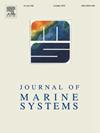珊瑚三角区印度尼西亚南苏拉威西西南海域珊瑚白化事件及其与海洋热浪事件的关系
IF 2.5
3区 地球科学
Q2 GEOSCIENCES, MULTIDISCIPLINARY
引用次数: 0
摘要
本研究调查了海洋热浪(MHWs)对印度尼西亚南苏拉威西岛西南水域珊瑚礁生态系统的威胁。基于1982年至2021年40年的数据,我们的分析显示,mhw的频率和强度都大幅增加,特别严重的事件发生在2010年、2013年、2016年、2019年和2020年。2016年的MHW尤其具有破坏性,其特点是极端的热应力和持续时间长,在小巽他群岛长达215天。这一事件与龙目岛等地区广泛出现的白化预警2级密切相关,这表明珊瑚死亡的风险很高。珊瑚礁健康指数(CRHI)与珊瑚覆盖(r = 0.83)和海草覆盖(r = 0.74)呈强正相关,与碎石覆盖(r = - 0.82)呈强负相关,是一种有价值的珊瑚礁评估工具。这些结果强调了珊瑚礁结构和底栖生物组成在维持生态系统健康方面的关键作用。此外,观测到的MHW峰值条件与白化事件发生之间的延迟强调了对集成多种观测方法的实时、高分辨率监测系统的需求。我们的研究结果强调了实施综合保护策略的紧迫性。这些措施应包括减少海洋变暖的全球行动和有针对性的地方努力,如保护高CRHI值的珊瑚礁,尽量减少当地的压力因素,以及提高海洋保护区的有效性。今后的研究应优先考虑将长期实地调查与先进的遥感技术结合起来,并纳入更广泛的海洋学变量,如水质和海洋酸化。这些方法对于产生可操作的数据至关重要,这些数据支持适应性管理和珊瑚礁生态系统的持续养护。本文章由计算机程序翻译,如有差异,请以英文原文为准。
Coral bleaching occurrence and its relation to marine heatwave events in the Southwestern waters of South Sulawesi, Indonesia, as part of the Coral Triangle region
This study investigates the escalating threat of marine heatwaves (MHWs) to coral reef ecosystems in the southwestern waters of South Sulawesi, Indonesia. Based on four decades of data from 1982 to 2021, our analysis reveals a substantial increase in both the frequency and intensity of MHWs, with particularly severe events occurring in 2010, 2013, 2016, 2019, and 2020. The 2016 MHW was especially devastating, marked by extreme thermal stress and prolonged duration, reaching up to 215 days in the Lesser Sunda Islands. This event closely aligned with widespread Bleaching Alert Level 2 warnings in regions such as Lombok, indicating a high risk of coral mortality. The Coral Reef Health Index (CRHI) proved to be a valuable tool for reef assessment, showing strong positive correlations with coral cover (r = 0.83) and seagrass cover (r = 0.74), along with a strong negative correlation with rubble cover (r = −0.82). These results highlight the crucial role of reef structure and benthic composition in sustaining ecosystem health. In addition, the observed delay between peak MHW conditions and the occurrence of bleaching events emphasizes the need for real-time, high-resolution monitoring systems that integrate multiple observation methods. Our findings underscore the urgency of implementing comprehensive conservation strategies. These should include global actions to reduce ocean warming and targeted local efforts such as protecting reefs with high CRHI values, minimizing local stressors, and enhancing the effectiveness of marine protected areas. Future research should prioritize the integration of long-term field surveys with advanced remote sensing technologies and the inclusion of a wider range of oceanographic variables such as water quality and ocean acidification. Such approaches are essential for generating actionable data that support adaptive management and the sustained conservation of coral reef ecosystems.
求助全文
通过发布文献求助,成功后即可免费获取论文全文。
去求助
来源期刊

Journal of Marine Systems
地学-地球科学综合
CiteScore
6.20
自引率
3.60%
发文量
81
审稿时长
6 months
期刊介绍:
The Journal of Marine Systems provides a medium for interdisciplinary exchange between physical, chemical and biological oceanographers and marine geologists. The journal welcomes original research papers and review articles. Preference will be given to interdisciplinary approaches to marine systems.
 求助内容:
求助内容: 应助结果提醒方式:
应助结果提醒方式:


